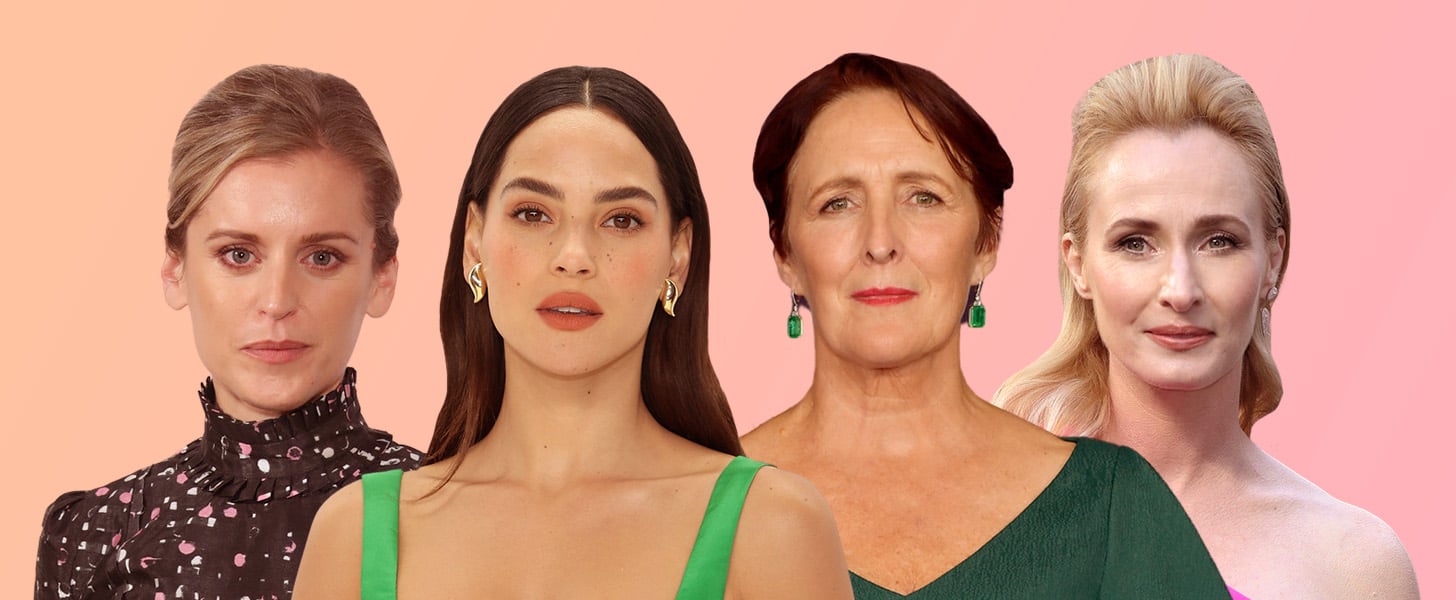
Image Source: Getty / Dimitrios Kambouris, Mike Marsland, and Matt Winkelmeyer and Photo Illustration: Keila Gonzalez
Even Star Wars superfans have been blown away by “Andor,” which mixes intrigue, politics, rebellion, love, and loyalty into one striking and stunning series. The show, which wrapped up its first season Nov. 23, takes its name from Cassian Andor, played by Diego Luna, who is first introduced as a rebel spy in “Rogue One.”
“Andor” is a prequel, but the series from showrunner Tony Gilroy isn’t just concerned with its title hero, whose journey focuses on his path to the center of the rebellion. The show is really about a sprawling network of people spread across a galaxy kept under the brutal fist of the Empire. We meet Bix, played by Adria Arjona, Cassian’s friend who’s just trying to scrape out a simple life. She has a deep bond with Cassian and his mother, Maarva, played by Fiona Shaw. Then there’s Senator Mon Mothma, a beloved Star Wars character. “Andor” finally gives actor Genevieve O’Reilly a chance to dig into what her life as a rebel senator is like. Then there’s the viciously methodical Dedra Meero, played by Denise Gough, a lieutenant in the Imperial Security Bureau who’ll stop at nothing to root out rebellion wherever it comes to life.
Arjona, Shaw, O’Reilly, and Gough all talked to POPSUGAR to reflect on the show’s first season and their character’s journeys through the 12 episodes.
Fiona Shaw on Maarva’s Final Rebellion
Perhaps no character makes a bigger splash in the season finale than Shaw’s Maarva. At the start of the 11th episode, viewers learn Cassian’s mother has died while he was incarcerated. Previously, in episode seven, Maarva and Cassian share one of their last conversations, where she tells him that she had decided to become a rebel now, even if he didn’t agree with her. “It’s overdue and probably doomed, and I’m too old, and I don’t care anymore,” she says as her son begs her to leave the planet Ferrix with him. “Aristotle said that there is only truth,” Shaw says of the moment. Maarva can’t pretend that she could leave with Cassian and everything would be fine. “If you know in your bones that something’s wrong, then you must act on it,” Shaw says. That’s how Maarva lives her life. “And that’s a very admirable trait.”
And while Maarva is clear-eyed about the need for rebellion, Cassian isn’t. “Playing that relationship was very good because she loves Cassian . . . and he, of course, lets her down as all the people we know and love let us down,” Shaw says.
“Most people would be more cautious in old age, and she’s the opposite in that she opts to incite something,” Shaw says of Maarva’s turn toward rebellion. She points out we think of old people as stuck in their ways, but Maarva is proof that older people shouldn’t be written off, that they can still be the thriving heart of their communities. “The wisdom of Maarva is a wisdom that is worth hearing, that actually is worth her being brave. And it’s because she knows that there’s no other option. She has enough experience to know that,” she says.
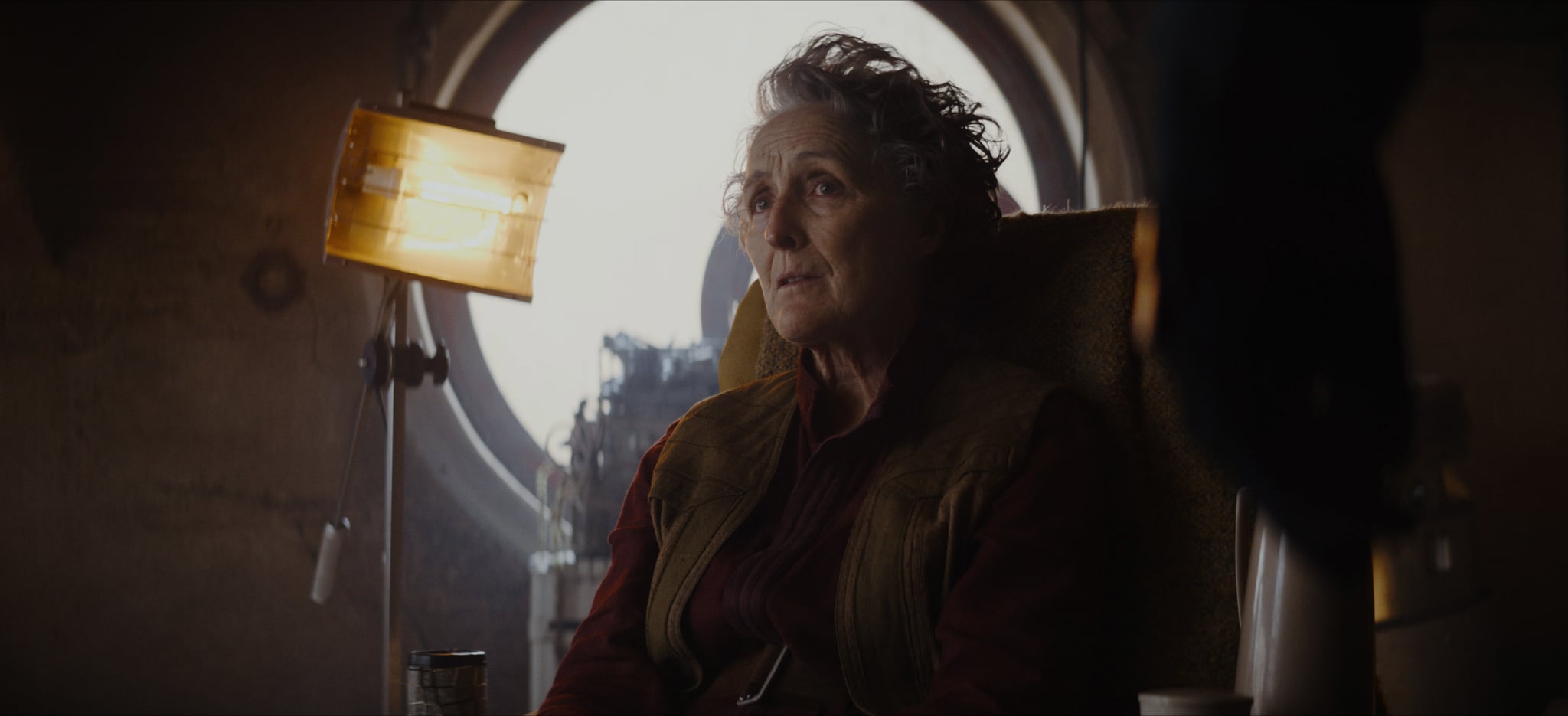
Image Source: Disney
During episode 12, Maarva’s funeral turns into her biggest act of rebellion. With all the community gathered to honor her and the Imperials watching for any sign of Cassian, B2 plays a hologram message Maarva recorded. She indicts her community for looking away from the Empire’s atrocities. She urges them to fight, launching a massive blowout between the citizens and the Imperials right there in the street.
To create the hologram effect in the scene, Shaw had to be completely alone in the studio with cameras pointing at her from every side. “It was a very lonely thing to do, but of course . . . it’s exactly what Maarva had to do.” She calls the speech itself “the most astonishing thing” and that she spent “months” learning and mastering it. “You very rarely get a piece that long in television to do on your own.”
Shaw is impressed with how Maarva is able to think past her own lifetime. “As a character, she has no idea the effect that [her speech] will have, that it will incite something that she will not see,” she says. “[She’s] somebody who’s very much come to terms with their own place in their world and their lifespan, and I don’t think we are very good at that on this planet.” It turns out Cassian is at the funeral in secret to hear his mother’s parting words, but Shaw says she doesn’t think Maarva was thinking about him at all when she recorded her words. But Cassian is Maarva’s child to the end, and it inspires him anyway.
Adria Arjona on Bix’s Sacrifice
Maarva’s relationship with Bix means a lot to both Shaw and Arjona. “Andor” was actually a reunion for the pair, who also worked together on NBC’s 2017 series “Emerald City.” “I love Adria. . . . It was very nice to see her again, because the lovely thing about working with somebody again is you have this shared history and you have trust,” Shaw says.
Arjona says that Maarva is Bix’s “biggest idol.” Bix is extremely loyal, and Arjona calls her a “tough cookie.” “What she inevitably ends up going through throughout this entire season is pretty horrific,” she says, and while Bix didn’t know exactly what the consequences of her actions would be for herself, “she knew that it was for greater cause, and that shows just how selfless Bix is.”
In episode nine, Dedra and the Imperials crack down on Cassian’s community to try to find him. She uses audio torture on Bix to try to get the info out of her. As viewers, we don’t hear the noise they play for Bix — we only hear Arjona’s horrifying scream.
“My vocal cords really, really took a toll on that scene,” Arjona says. She explains that she, the directors, and Gilroy all wanted to do a type of torture that hadn’t been seen on screen before. Arjona was inspired in part by people who’ve developed tinnitus as a result of COVID-19 infections. “It affected so many people psychologically,” she says. “And if you put that to a different degree and you hear all these things, how crazy can it really drive you? And how horrific is that first moment?” she says.
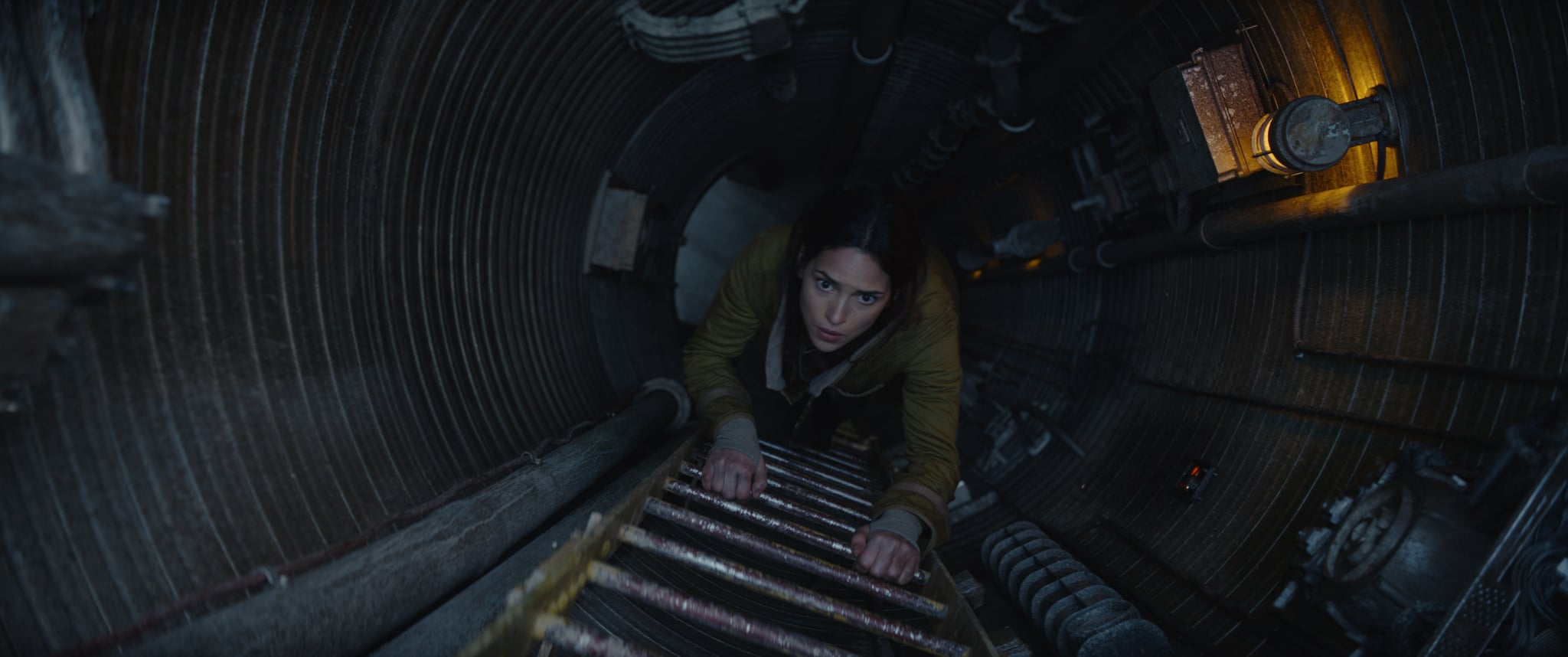
Image Source: Disney
Dedra grinds Bix down, but she’s not broken. During the funeral scene, an imprisoned Bix hears Maarva’s voice, and Arjona says it’s “heartbreaking” because Bix honestly doesn’t fully understand that Maarva’s dead and gone. But hearing the fighting in the street, she feels her pride in Ferrix. “She feels that everything she’s gone through wasn’t in vain,” she says.
By the end of the episode, Cassian saves her and puts her on a ship headed to safety. “One of my favorite lines at the end is the line that Bix tells everybody on that ship,” Arjona says. “She’s like, ‘Cassian will find us,’ and then she looks at him and goes, ‘He’ll find us.’ And it’s that trust in their friendship and their love and the loyalty that they have as friends that kept her afloat the entire time.”
For Bix, rebelling is a “simple decision. “It’s either you take a step back and stay quiet, or you take a step forward and you speak out for what you think is right and what you believe in,” Arjona says. As a woman of color living in an ever-changing world, Arjona identified emotionally with Bix’s journey. “I’ve felt this before. I know what this is, even if I might not be in the front role of it all, but I need to be a part of it,” she says.
Genevieve O’Reilly on the Loneliness of Mon Mothma
O’Reilly sees her character Mon Mothma’s journey as all about choices — especially the ones the character wasn’t allowed to make as a young woman. As we learn in “Andor,” at 15 she had an arranged marriage, and at 16 she joined the Galactic Senate. “She essentially is married to the Empire now,” O’Reilly says. “I don’t think she had much of a choice in that. A lot of her own choices are dangerous. . . . She is operating in a glass cage.”
O’Reilly notes that Mon Mothma has been “iconic” in the world of Star Wars for a long time; the character made her first appearance in 1983’s “Return of the Jedi,” played then by Caroline Blakiston. “What I find so valuable about this version of Mon Mothma is that we are seeing her not just as that icon, that pillar, that statue, that leader, but we are seeing the woman that it takes to be that, the weight that it is to carry that, how difficult it is to be a voice of diplomacy in a world of aggression and incarceration and brutality,” O’Reilly says. She values words and diplomacy in a world that’s dominated by war and violence. “Something else that I love about what they’re allowing time to explore is just how lonely that is.”
Mon Mothma’s loneliness is one of the biggest prices she pays for the rebellion. She has just one moment of respite when her cousin Vel (Faye Marsay), another rebel, visits in episode nine. O’Reilly was so happy that Gilroy added that connection between the characters. “It was such a relief that she has at least one ally,” she says. “That was really perhaps the only moments you see her truly vulnerable.”
However, O’Reilly does think there’s one place where Mon Mothma lets some of her personality shine through: her clothes. O’Reilly thinks of them as the senator’s “armor.” “It’s interesting because it’s a costume, but it also feels, for me within her, quite authentic,” she says. “It’s a good place to hide.”
Denise Gough on Playing a Meticulous Fascist
Gough’s Dedra also takes great pride in the costume she wears — her Imperial uniform. But the actor says you wouldn’t be able to tell Dedra she was the villain in this tale. “Dedra’s like the hero of her own story,” Gough says. “She’s also quite rebellious in her methods and meticulous.” She doesn’t think Dedra is particularly ambitious or sadistic; her joy out of torturing Bix isn’t because of the violence but because she’s executing her plan. “She’s a perfectionist,” Gough says. “She just also happens to be a fascist.”
A lot of viewers took a few episodes to believe that Dedra was really, truly the bad guy. “Maybe it’s just in our nature to want people, especially women, to eventually soften up or something,” Gough guesses about their reaction. She admits she doesn’t know what Gilroy has planned for the second season, but she feels “it would be a disservice” to change her path at this point.
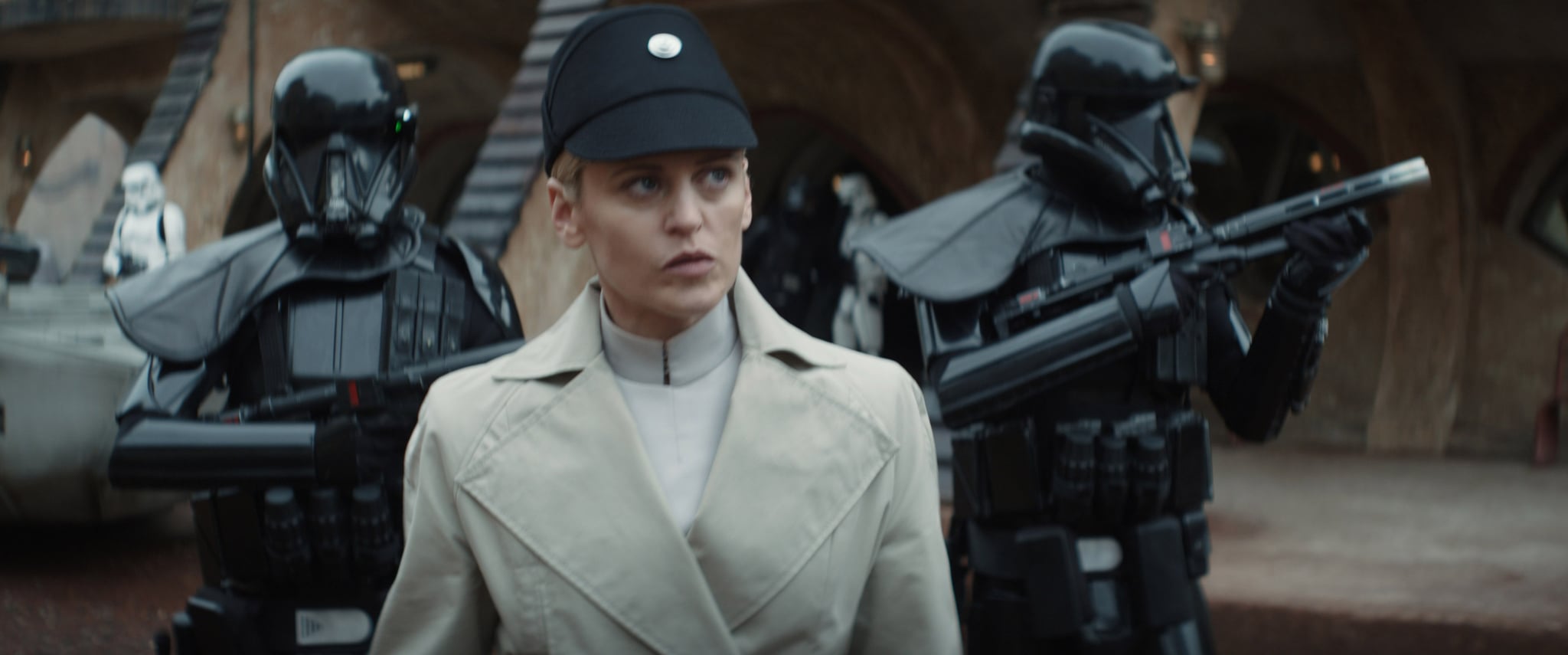
Image Source: Disney
But she thinks by the time the finale premiered, viewers had been won over by her character. “I don’t sense that people want her to change now,” she says. But she admits she was also a little worried that Dedra would be “softened” or — even worse — fall in love. So at first, she was concerned when she read the script for the finale. After Maarva’s rousing speech, chaos breaks out, and Dedra’s almost carried away by a group of residents turned rebels. She’s saved by a mysterious person, only to realize it’s Syril Karn (Kyle Soller), who’s obsessed with her. But for Gough, it’s not really about Dedra getting saved.
“What happens to her in a room with the man who hasn’t given up on her,” she wonders. “I don’t imagine Dedra to have had many intimate relationships. . . . And also we made sure that she wasn’t happy about it.” Dedra is more in shock than anything; she grabs a random piece of machinery to attack him with, and only watching the scene back did Gough realize she was literally shaking while filming it.
Gough likes the way Dedra’s plot line subverts our expectations for stories about women. “She started out as somebody, we were all like, ‘Yay, go on,'” she says. She’s a woman in a men-dominated workplace. Gough says it’s easy for viewers to root for Dedra to tell her lazy coworkers off. “And then you’re like, ‘Oh my god, no, don’t do that, though. That’s terrible. That’s a terrible thing to do.'” It’s a critique of that girl-boss mindset “without kind of punching you in the face about this.”
Gough loves that once Dedra proves she’s a maverick, she moves up the chain of command. “[Her superiors] are just like, ‘That crazy lunatic will go to any lengths to protect this Empire,'” she says. “But you can’t trust anyone in the Empire. Everybody’s afraid all the time of being shafted.” The Empire is “dysfunctional and toxic,” she adds, “so for her to survive and thrive in it, I think you do have to be a certain type of person to be able to do that.”
On Season 1’s Legacy and Where They’re Headed For Season 2
Each of the four actors interpret the politics of “Andor” in a different way, but they say you can’t avoid how political the text is. Arjona notes that she’s from Puerto Rico, where there have been “so many versions” of protest movements. Shaw, O’Reilly, and Gough are all Irish, and Shaw lived through years of Irish unrest. “Our world and our history is intricately woven with colonialism, and ‘Andor’ really leans into that, the impacts of colonialism,” O’Reilly says. “Politicians and rebellions coming together to find common ground to access peace is within my lifetime, within my country. So it’s fair, and it is happening all around the world now.”
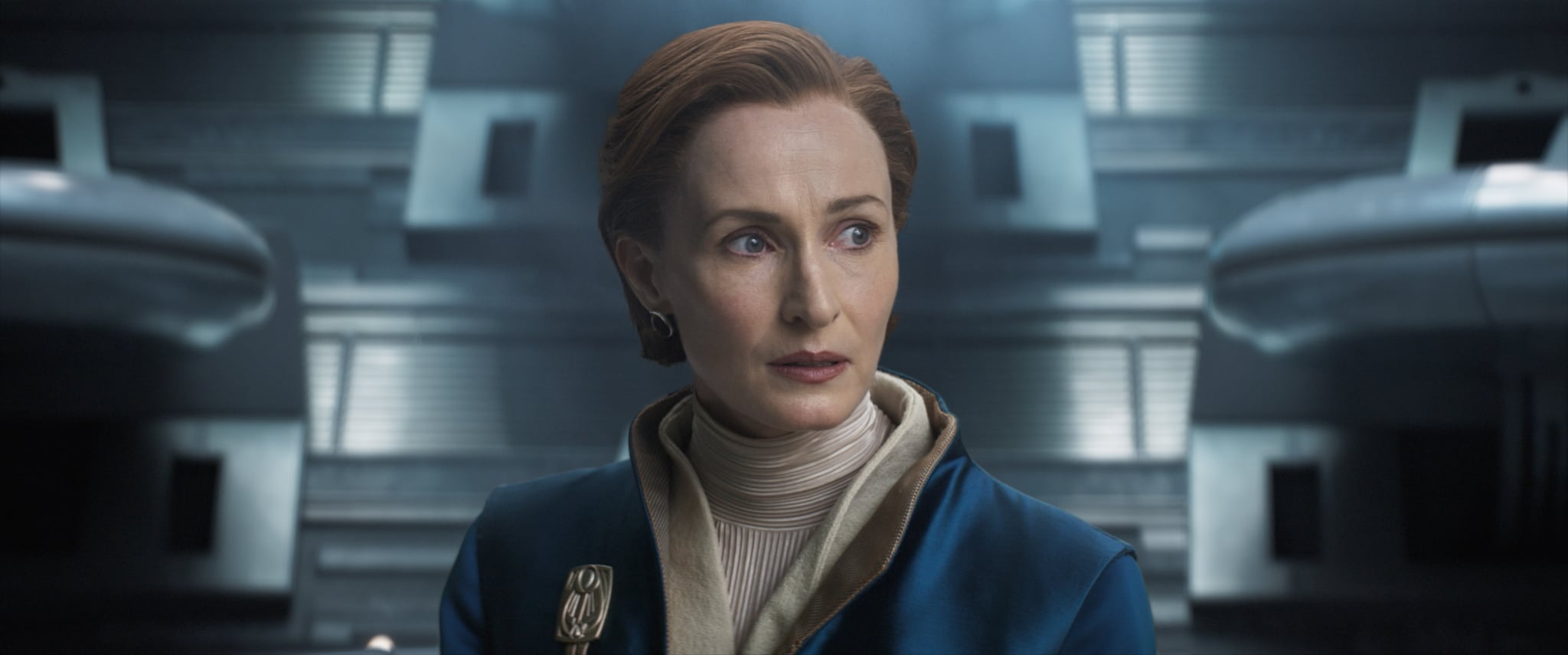
Image Source: Disney
Gough couldn’t be more effusive about how much she loves being part of “Andor.” “I’ve never been more proud of anything I’ve done on screen ever,” she says. O’Reilly loves how many different women are contained in the show. “We have to thank women like Geena Davis and the Institute for Gender Representation in Media who have really advocated for female representation within narrative and within our films and our television,” she says. “And we’re not there yet. We’re nowhere near parity.” But she notes that even between the other times she’s played Mon Mothma and now, “we’ve made significant progress for women and gender diversity within our storytelling.”
“I’m grateful that I’m having the opportunity to genuinely explore her,” she says. “Now, as a woman, she’s much more than a force for exposition or a mouthpiece or a statue for a rebellion. I think even in season two, they will go even further with this. . . . We’re learning what it costs to be a female rebel.”
Gough, O’Reilly, and Arjona all drop hints about season two, which is preparing for filming right now. They’ve all talked to Gilroy at least a bit about their characters’ journeys. Season two is set to cover the last four years before “Rogue One” takes place, and O’Reilly notes that the current “Andor” version of her character still isn’t in the place she is at the beginning of “Rogue One,” a leader in the Rebel Alliance. “I’m hopeful that it will be really gritty and dextrous and dramatic and just exciting. I’m excited to go back to this, [which is] not always the case,” she says.
Gough only says, “I’ve got some really tricky stuff to manage next season.” Arjona says she has a lot of ideas for where Bix’s story could go but jokes, “I trust Tony Gilroy’s brain more than I trust my own.”
But for now, there are a lot of Star Wars fans to meet. Gough did her first event at October’s Lucca Comics & Games Convention in Italy at the end of October. She got emotional seeing so many women dressed like her character.
Arjona says the impact of being a Latin American actor in Star Wars didn’t really hit her until she started to meet fans. “I had this beautiful moment with this woman on the red carpet of our premiere in LA, and she was already dressed up as Bix,” she recalls. “The only thing that had come out was the trailer. She was in full costume. And I just got so moved by that, and she was Latin American. She just started crying and telling me how amazing and how important it is for her as a Star Wars fan to see herself in this show.”
“I keep having little moments like that,” Arjona says. “As each episode airs, I’ll have more and more. And it’s just really, really special, and it’s really gratifying. I don’t think I’ve felt that before.”
All 12 episodes of “Andor” season one are streaming now on Disney+.
